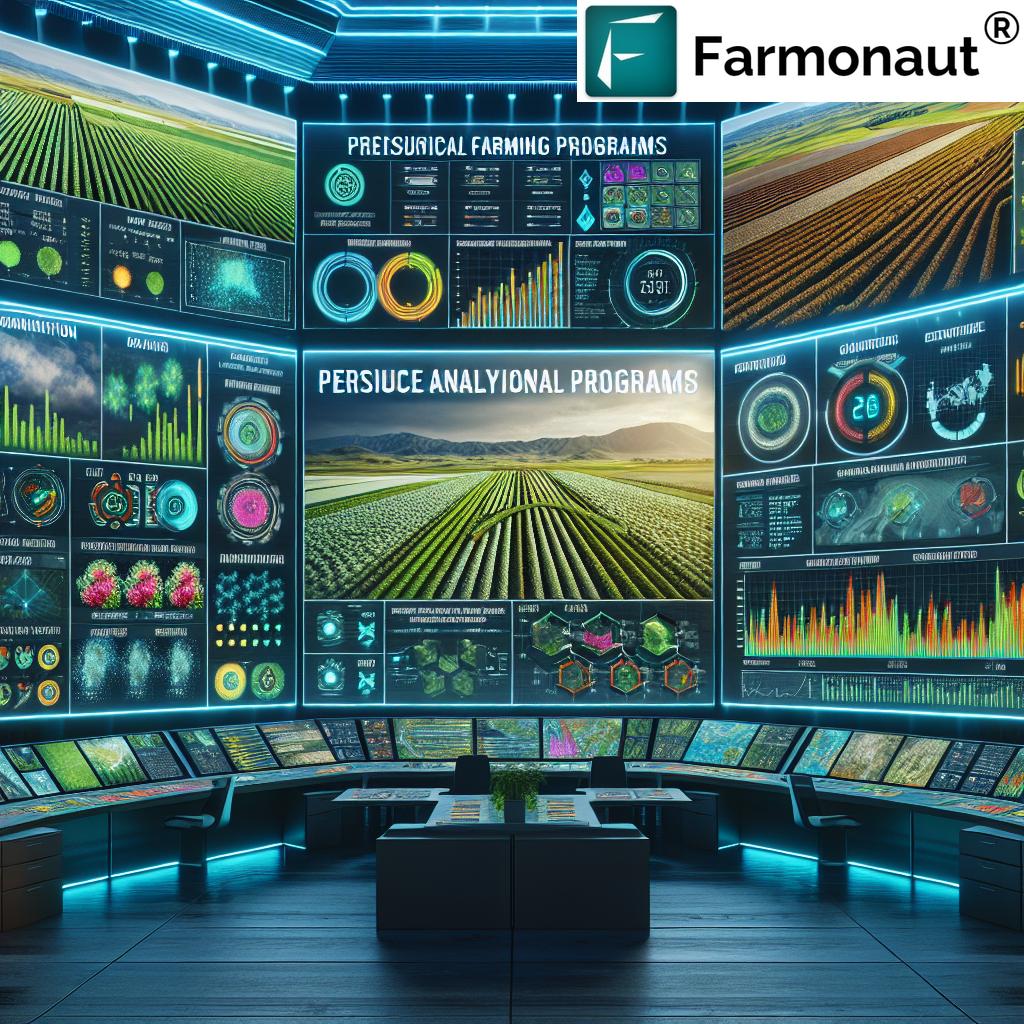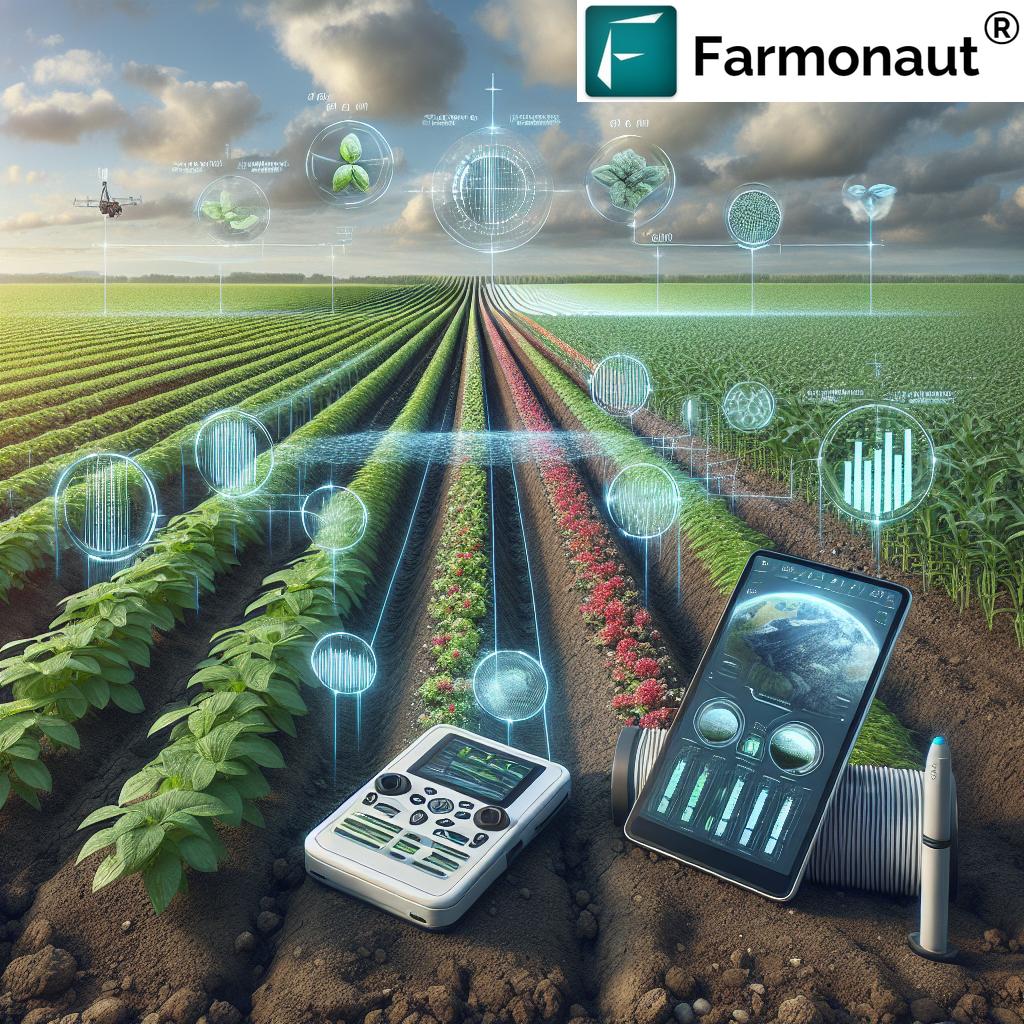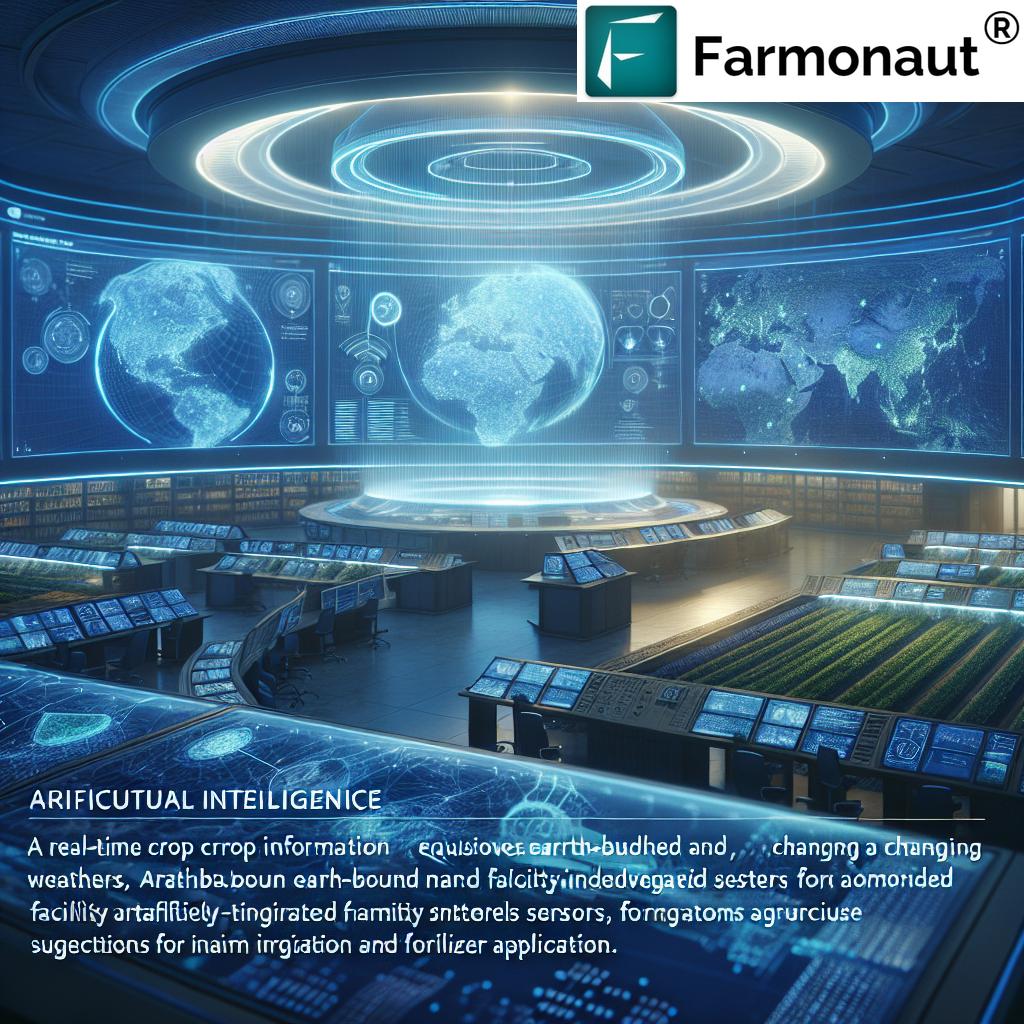Maximizing Agricultural Revenue: Farmonaut’s Guide to Precision Farming Economics and Crop Yield Optimization
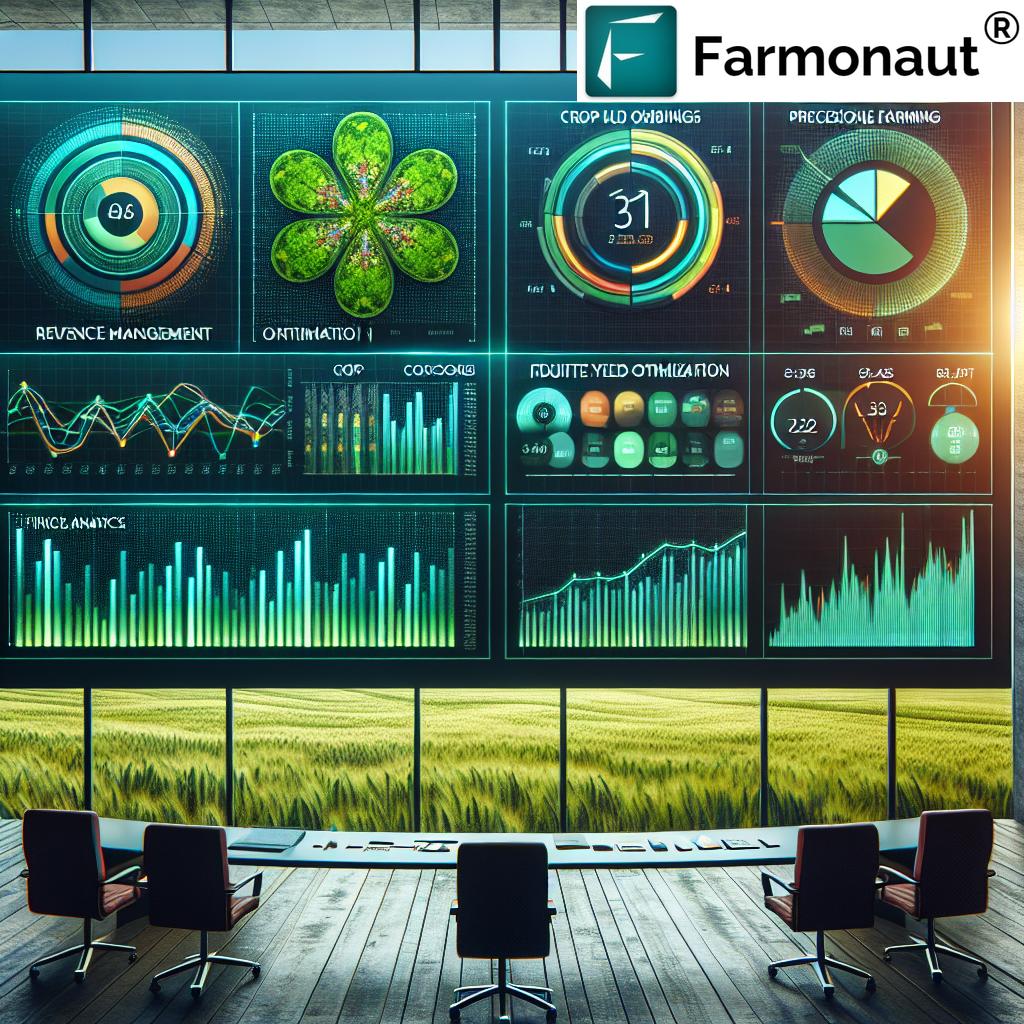
“Precision farming techniques can increase crop yields by up to 30% while reducing water usage by 20-50%.”
In the ever-evolving landscape of modern agriculture, maximizing agricultural revenue has become a critical focus for farmers, agribusinesses, and industry professionals alike. As we navigate the complexities of agricultural revenue management and explore the latest trends in agritech financial performance, it’s clear that precision farming economics and crop yield optimization are at the forefront of this agricultural revolution.
At Farmonaut, we’re committed to providing cutting-edge solutions that empower farmers and agribusinesses to make data-driven decisions, optimize their operations, and ultimately boost their bottom line. In this comprehensive guide, we’ll delve into the intricate world of agricultural sector investments, farm technology ROI, and the transformative power of agricultural data analytics.
The Evolution of Agricultural Revenue Management
Agricultural revenue management has come a long way from traditional farming practices. Today, it encompasses a wide range of strategies and technologies aimed at maximizing profits while ensuring sustainable agriculture. Let’s explore some key aspects:
- Precision farming techniques
- Data-driven decision making
- Sustainable agriculture practices
- Innovative crop yield optimization strategies
As we delve deeper into these topics, it’s important to note the significant impact that agritech solutions are having on the industry. Our satellite-based farm management platform at Farmonaut is at the forefront of this revolution, offering real-time insights and AI-powered recommendations to farmers worldwide.
Explore our cutting-edge solutions:
The Role of Agritech in Financial Performance
Agritech financial performance is becoming increasingly important as farms and agribusinesses seek to optimize their operations and increase profitability. Here’s how technology is reshaping the financial landscape of agriculture:
- Satellite-based crop monitoring: Real-time data on crop health and growth stages
- AI-driven advisory systems: Personalized recommendations for optimal resource allocation
- Blockchain-based traceability: Enhanced supply chain transparency and product authenticity
- IoT sensors: Precise monitoring of soil conditions, weather, and crop status
These technologies not only improve operational efficiency but also contribute significantly to the overall financial health of agricultural enterprises. At Farmonaut, we’ve seen firsthand how our platform’s insights have helped farmers make better decisions, leading to improved crop yields and reduced input costs.
Precision Farming Economics: A Game-Changer for Agriculture
Precision farming economics is revolutionizing the way we approach agriculture. By leveraging advanced technologies and data analytics, farmers can now make highly informed decisions that optimize resource use and maximize yields. Here’s how precision farming is impacting the economics of agriculture:
- Reduced input costs through targeted application of fertilizers and pesticides
- Improved water management and irrigation efficiency
- Enhanced crop quality and yield through precise monitoring and intervention
- Minimized environmental impact and improved sustainability
Our Farmonaut platform integrates these precision farming principles, offering farmers a comprehensive suite of tools to monitor, analyze, and optimize their operations. From satellite imagery to AI-powered insights, we’re helping farmers embrace the future of precision agriculture.
Discover our mobile solutions:
Crop Yield Optimization: Strategies for Success
Crop yield optimization is at the heart of agricultural revenue management. By implementing data-driven strategies and leveraging advanced technologies, farmers can significantly increase their yields while minimizing resource use. Here are some key strategies:
- Variable rate application: Tailoring input application based on field variability
- Predictive analytics: Anticipating potential issues before they impact crop health
- Precision planting: Optimizing seed placement and spacing for maximum yield
- Smart irrigation systems: Delivering water precisely when and where it’s needed
At Farmonaut, our platform integrates these strategies, providing farmers with actionable insights to optimize their crop yields. By combining satellite imagery, weather data, and AI-powered analytics, we help farmers make informed decisions that drive productivity and profitability.
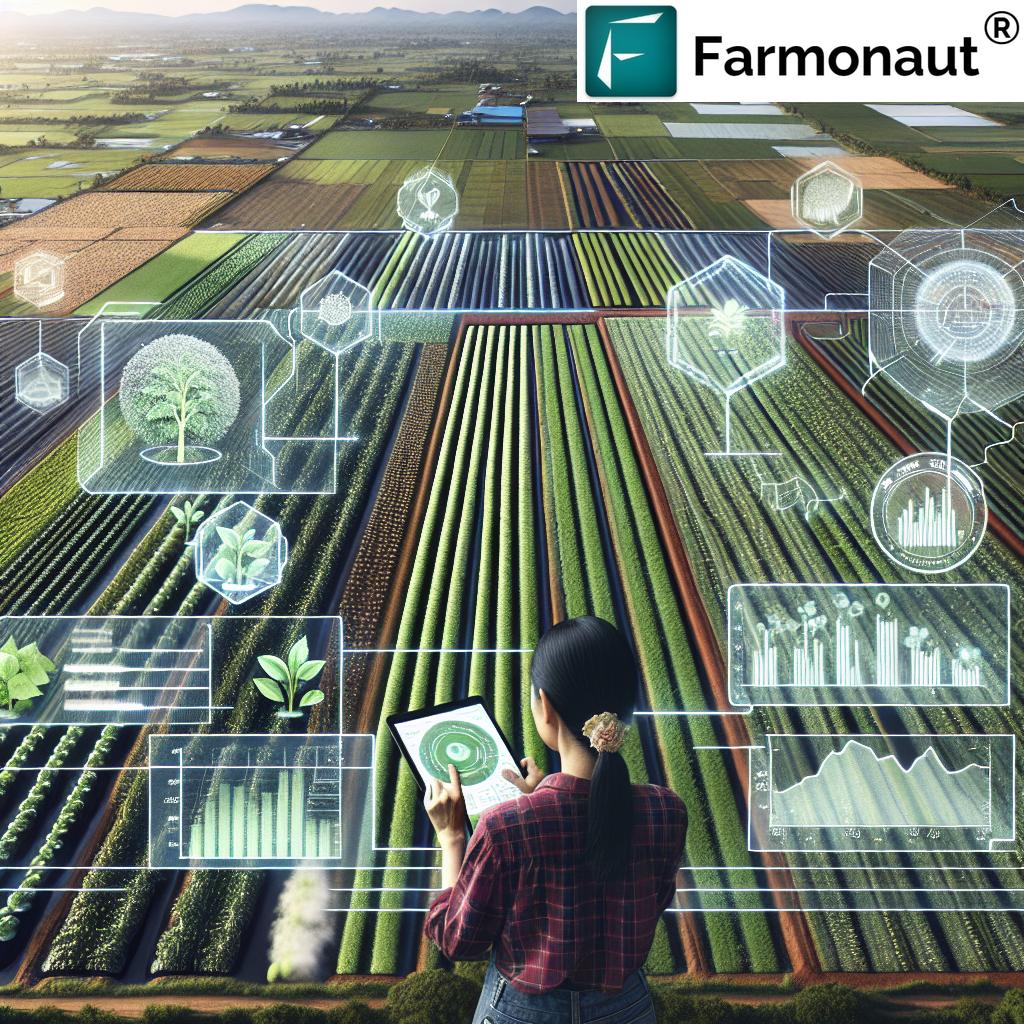
“Agricultural data analytics can improve farm profitability by 15-20% through optimized resource allocation and decision-making.”
The Impact of Agricultural Data Analytics on Farm Profitability
Agricultural data analytics is transforming the way farms operate, providing unprecedented insights into every aspect of agricultural operations. Here’s how data analytics is driving profitability:
- Improved forecasting and planning
- Enhanced risk management
- Optimized resource allocation
- Data-driven decision making
Our Farmonaut platform harnesses the power of agricultural data analytics, offering farmers a comprehensive view of their operations. From soil health to crop performance, our analytics provide the insights needed to make informed decisions and drive profitability.
Leverage our API for custom solutions:
Farmonaut API
API Developer Docs
Sustainable Agriculture Profits: Balancing Economics and Environment
In today’s agricultural landscape, sustainability is not just an environmental concern but a key factor in long-term profitability. Sustainable agriculture practices can lead to:
- Reduced input costs
- Improved soil health and productivity
- Enhanced brand value and market access
- Long-term financial stability
At Farmonaut, we’re committed to promoting sustainable agriculture through our technology. Our platform helps farmers implement sustainable practices while maintaining profitability, creating a win-win situation for both the environment and the bottom line.
The Future of Agricultural Sector Investments
As we look to the future, agricultural sector investments are increasingly focused on innovative technologies and sustainable practices. Here are some key trends shaping the investment landscape:
- AgTech startups: Driving innovation in farming technologies
- Sustainable agriculture funds: Focusing on environmentally responsible farming practices
- Precision agriculture investments: Capitalizing on data-driven farming solutions
- Vertical farming ventures: Exploring new frontiers in urban agriculture
These investment trends highlight the growing recognition of technology’s role in shaping the future of agriculture. At Farmonaut, we’re proud to be at the forefront of this revolution, offering innovative solutions that attract investment and drive industry growth.
Farm Technology ROI: Measuring the Impact of Agritech Investments
Understanding the return on investment (ROI) of farm technology is crucial for farmers and investors alike. Here’s how to evaluate the ROI of agritech solutions:
- Quantify improvements in crop yields
- Measure reductions in input costs
- Assess labor efficiency gains
- Consider long-term sustainability benefits
At Farmonaut, we provide tools and analytics that help farmers track and measure the ROI of their technology investments. Our platform’s insights enable farmers to make data-driven decisions about which technologies to adopt and how to maximize their returns.
Agribusiness Financial Reporting in the Digital Age
The digital transformation of agriculture has also revolutionized agribusiness financial reporting. Modern agribusinesses now benefit from:
- Real-time financial tracking: Up-to-the-minute insights into financial performance
- Automated reporting: Streamlined processes for generating financial statements
- Predictive financial modeling: Forecasting future performance based on historical data and trends
- Integrated supply chain financials: Comprehensive view of financial impacts across the entire supply chain
Our Farmonaut platform contributes to this evolution by providing detailed data on farm operations, which can be seamlessly integrated into financial reporting systems. This integration enables more accurate, timely, and insightful financial reporting for agribusinesses of all sizes.
Precision Farming Technologies and Their Economic Impact
To better understand the economic implications of various precision farming technologies, let’s examine this comparative table:
| Technology Name | Initial Investment Cost | Annual Operating Cost | Potential Yield Increase | Estimated ROI | Payback Period |
|---|---|---|---|---|---|
| Satellite-based Crop Monitoring | $5,000 – $20,000 | $1,000 – $5,000 | 10% – 20% | 15% – 30% | 1 – 3 years |
| Drone-based Imaging | $2,000 – $10,000 | $500 – $2,000 | 5% – 15% | 10% – 25% | 1 – 2 years |
| IoT Sensors for Soil and Weather Monitoring | $10,000 – $50,000 | $2,000 – $10,000 | 15% – 25% | 20% – 35% | 2 – 4 years |
| Variable Rate Application Systems | $20,000 – $100,000 | $5,000 – $20,000 | 20% – 30% | 25% – 40% | 3 – 5 years |
| AI-powered Crop Management Platforms | $15,000 – $75,000 | $3,000 – $15,000 | 15% – 30% | 20% – 40% | 2 – 4 years |
This table illustrates the potential economic impact of various precision farming technologies. While initial investments may seem substantial, the long-term benefits in terms of yield increases and ROI are significant. At Farmonaut, we offer solutions that combine many of these technologies, providing a comprehensive and cost-effective approach to precision farming.
Food Industry Financial Analysis: The Role of Agritech
The food industry’s financial landscape is increasingly influenced by advancements in agricultural technology. Here’s how agritech is shaping food industry financial analysis:
- Enhanced supply chain visibility and cost management
- Improved forecasting of raw material costs and availability
- Better quality control leading to reduced waste and recalls
- Increased consumer trust through traceability, potentially boosting sales and brand value
Farmonaut’s blockchain-based traceability solutions play a crucial role in this aspect, providing food industry players with the tools they need to ensure transparency and build consumer trust.
Challenges and Opportunities in Agricultural Finance
While the potential of agritech is immense, the agricultural finance landscape also presents several challenges and opportunities:
Challenges:
- High initial investment costs for new technologies
- Complexity of integrating multiple tech solutions
- Data privacy and security concerns
- Adapting traditional financing models to new agricultural practices
Opportunities:
- Innovative financing models tailored to agritech adoption
- Improved risk assessment leading to better loan and insurance products
- New revenue streams from data monetization
- Enhanced sustainability leading to access to green financing options
At Farmonaut, we’re working to address these challenges and capitalize on the opportunities by providing comprehensive, user-friendly solutions that make advanced agricultural technologies accessible to farmers of all sizes.
The Future of Agricultural Revenue Management
As we look to the future, several trends are set to shape the landscape of agricultural revenue management:
- AI and machine learning: Advanced predictive analytics for crop management and market forecasting
- Blockchain technology: Enhanced traceability and transparency across the agricultural supply chain
- IoT and edge computing: Real-time data collection and processing for immediate decision-making
- Vertical and urban farming: New agricultural models requiring innovative financial approaches
- Climate-smart agriculture: Financial strategies aligned with environmental sustainability
Farmonaut is at the forefront of these trends, continuously evolving our platform to meet the changing needs of the agricultural sector. We’re committed to providing farmers and agribusinesses with the tools they need to thrive in this dynamic landscape.
Conclusion: Embracing the Agritech Revolution
The agricultural sector is undergoing a profound transformation, driven by technological innovation and a growing focus on sustainability. From precision farming economics to crop yield optimization, the opportunities for maximizing agricultural revenue are immense. At Farmonaut, we’re proud to be part of this revolution, offering cutting-edge solutions that empower farmers and agribusinesses to thrive in this new era of agriculture.
By embracing data-driven decision-making, leveraging advanced technologies, and prioritizing sustainability, the agricultural sector can not only boost profitability but also contribute to global food security and environmental conservation. The future of agriculture is here, and it’s more exciting and promising than ever before.
Are you ready to take your agricultural operations to the next level? Explore Farmonaut’s solutions and join the agritech revolution today!
Frequently Asked Questions (FAQ)
Q: What is precision farming, and how does it improve agricultural revenue?
A: Precision farming is an approach that uses technology to optimize crop yields and reduce waste. It improves revenue by increasing efficiency, reducing input costs, and maximizing crop yields through data-driven decision-making.
Q: How does Farmonaut’s platform contribute to sustainable agriculture?
A: Farmonaut’s platform promotes sustainable agriculture by providing farmers with tools for efficient resource management, reducing water and chemical usage, and optimizing crop health, all of which contribute to environmentally friendly farming practices.
Q: What types of data does Farmonaut’s agricultural data analytics cover?
A: Farmonaut’s analytics cover a wide range of data, including satellite imagery for crop health monitoring, weather data, soil moisture levels, and historical crop performance. This comprehensive approach enables farmers to make informed decisions across all aspects of their operations.
Q: How can farmers measure the ROI of implementing agritech solutions?
A: Farmers can measure ROI by tracking improvements in crop yields, reductions in input costs (such as water, fertilizers, and pesticides), labor efficiency gains, and long-term sustainability benefits. Farmonaut’s platform provides tools to help quantify these improvements.
Q: What are the main challenges in adopting precision farming technologies?
A: The main challenges include initial investment costs, the complexity of integrating multiple technologies, data privacy concerns, and the need for training to effectively use new systems. However, the long-term benefits often outweigh these initial challenges.
Q: How does blockchain technology enhance agricultural supply chains?
A: Blockchain technology enhances agricultural supply chains by providing transparent, immutable records of product journeys from farm to consumer. This improves traceability, reduces fraud, and builds consumer trust in food products.
Q: Can small-scale farmers benefit from Farmonaut’s solutions?
A: Yes, Farmonaut’s solutions are designed to be scalable and accessible to farmers of all sizes. Our platform offers affordable options that can significantly improve operations even for small-scale farms.
Q: How does Farmonaut’s platform integrate with existing farm management systems?
A: Farmonaut offers API integration options, allowing our platform to seamlessly connect with existing farm management systems. This enables farmers to centralize their data and decision-making processes.
Q: What future trends in agritech should farmers be aware of?
A: Key trends include the increasing use of AI and machine learning for predictive analytics, the integration of IoT devices for real-time monitoring, the adoption of vertical and urban farming techniques, and the growing importance of climate-smart agriculture practices.
Q: How can agribusinesses use Farmonaut’s data for financial reporting and planning?
A: Agribusinesses can use Farmonaut’s data to enhance their financial reporting by incorporating real-time crop performance metrics, yield forecasts, and resource utilization data. This information can improve accuracy in financial planning, budgeting, and investment decisions.











